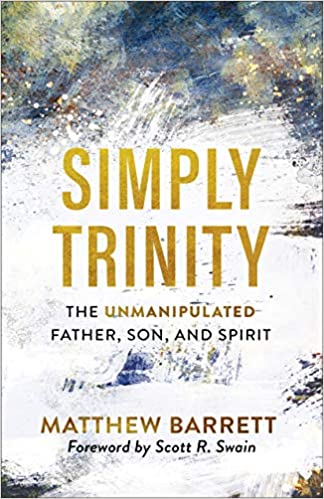An Author Interview from Books At a Glance
Zaspel:
Greetings, and welcome to another Author Interview here on Books At a Glance.
Our generation has seen a renewal of interest in the doctrine of the Trinity, and in very recent years the doctrine has been surrounded by considerable controversy. Dr. Matthew Barrett writes to address that controversy but also to establish the doctrine itself in a robust way. He is here to talk to us today about his new book, Simply Trinity: The Unmanipulated Father, Son, and Spirit.
Matthew, welcome back, and congratulations on your new book.
Barrett:
Thanks for having me back again!
Zaspel:
In brief, what is the biblical concept of the Trinity? Maybe we can just be concise here and explore the specifics next, but what are the necessary factors that make up this doctrine?
Barrett:
This is one of the doctrines that is apart of the deep things of God. This is the holy Trinity, but also the mystery of the Trinity. This should humble us. As we approach the infinite, incomprehensible Trinity. We can set out to define the Trinity that is faithful to the Scriptures and stand on the shoulders of the church fathers. We can use them to define the Trinity in a faithful way.
When we talk about God, this is the God of the Pentateuch, it says he is one. The Israelites confessed the Lord our God is one. This is the doctrine of divine simplicity. Not that he is basic and easy, rather by simple, we mean this is a God who IS one. Without parts and not composed. So many who came before labored so hard to try and articulate what Scripture says in a faithful way. These persons: Father, Son, and Holy Spirit are one. They are one in essence that subsists in Father, Son, and Holy Spirit. What distinguishes the Trinity? When we refer to these distinctions, we can refer in eternal relations of origin. These eternal relations alone distinguish the Trinity. Naturally, we tend to project our own experience back onto an eternal, infinite, incomprehensible God.
Zaspel:
The “Simply” in your title – Simply Trinity – of course refers to the doctrine of divine simplicity. This is a doctrine that has made a bit of a come-back in recent years, but it is still a bit foreign to many. So, what is the doctrine of divine simplicity, and how is it necessary to the doctrine of the Trinity?
Barrett:
In years past simplicity has fallen on hard times. For the majority of church history when creeds were written, simplicity was considered foundational for a right understanding of the Christian God. It has disappeared and been rejected; this is quite serious. Divine simplicity protects God from being finite. Holding to this eliminates any notion of divisibility. God’s essence is his attributes, and his attributes are his essence. All that is in God simply is God. That language gets us away from a type of being who would be divisible. Simplicity is crucial, it keeps us from a whole variety of trinitarian heresies.
How can God be simple if he is triune? He is triune according to these persons but is simple according to his essence. The heresy of tri-theism, for example, on one hand, is not as if he is multiplied three times. This would result in three different Gods. That would divide the essence of God up. There are wonderful implications of the doctrine of the Trinity and how it works in salvation and creation. They work as one. Inseparable operations.
In the 20th century, it became popular to hold to social trinitarianism. The Trinity was not defined in the way we define it. It was redefined in terms of a divine society. The persons of the Trinity had their own consciences and will. This definition became analogous to human society. By doing this the charge of tri-theism quickly came. Simplicity helps us avoid this danger as well. It is not cooperation that unites them, but they are subsistent of the same essence. They have the same unified will. This is very relevant to challenges we are facing today.
Zaspel:
Let’s talk about Trinitarian relations. Like so many of us have been taught when we define the Trinity, there is one God and yet three persons are one God and each is God and each is distinct, that is as far as it goes. We want to include the idea of relations, right?
Barrett:
There is a bit of a disconnect. We will approach the Trinity in a formulaic way. We just look at verses that talk about God being one-, or each-person being God. We then try to make the leap to say one in essence, three in person. The problem with that type of approach is that we can check off the orthodoxy part, but we do not know why that is the case or explain how we get there. When we look at Scripture, the Trinity is revealed to us in a more organic way. The names themselves are quite revelatory. The missions of each person, for example, the Father sends the Son. This mission says something about the Son’s procession. It is a type of mosaic. Different biblical authors will prepare their readers to help us understand the roles.
How can Jesus say he is one with the Father? He means something eternal; he is equal with the Father. This is why the religious leaders act so surprised. They knew he was claiming equality with God. The doctrine of eternal generation distinguishes and safeguards the Trinity. Sometimes in the last several decades these doctrines have been looked at with suspicion or rejected. We do not realize these doctrines are foundational. It is not just the begetting language. In John’s Gospel, he talks of begetting and a mosaic of all kinds of metaphors and language as well. Hebrews 1 speaks of the Son as the radiance of the glory of God. Halfway through the writer goes to the Psalms and uses begetting language.
It is not accidental when you read the Nicene Creed, it says, the Son is true God of true God, begotten not made, and he is life from life. It is using the biblical language of radiance and communicating the from-ness. The Spirit is spoken of in a way to communicate the direction of being from the Father and the Son. We must always be careful because we do not want to insert anything carnal into the Trinity. There is not a before and after. It means there is not a posteriority or inferiority. We must always remember that Scripture is communicating something specific about their eternal origin here. Not in a way that would apply our limitations.
Zaspel:
Your subtitle is The Unmanipulated Father, Son, and Spirit. Here you are aiming at various contemporary adjustments that have been made to the doctrine of the Trinity. Talk to us about some contemporary adjustments to orthodox trinitarianism – “social” trinitarianism and then more recent developments. Explain how these are harmful to the biblical doctrine
Barrett:
The subtitle is meant to poke you a bit. I chose this subtitle carefully because in the last 20th century, even in the modern era, there seems to be a subtle, Trinity drift. Part of it is due to the rise of social trinitarianism. What kind of Trinity was being propped up? Many now recognize this has not been the Trinity of historic Christian orthodoxy. It has now been defined in terms of societal roles and relationships. This redefinition of the Trinity in social categories was quite convenient. A social trinitarianism can support all sorts of heresies.
We have manipulated the Trinity for just about every agenda under the sun, even to argue for homosexuality. Perhaps we need to pause and go back to the basics. We need to try and understand how the church has defined the Trinity based on Scripture. They have defined it to be protected from manipulation. There is a danger here. Sometimes as reformed evangelicals we tend to think the problem is out there. Could it be the case that even evangelicalism has been more influenced than we like to admit or are aware of? We do not want to compromise on doctrines like divine simplicity and eternal generation.
Zaspel:
Explain how the doctrine of the Trinity relates to the gospel and our salvation.
Barrett:
When we talk about the Trinity we are getting into difficult concepts and this should not scare us. We need to go into the deep things of God. What people will discover is that the world opens for us if we are faithful to an orthodox understanding of the Trinity. We see an example of eternal generation in John’s Gospel. Before he gets to the Gospel of Jesus Christ, he starts off by reflecting on who the Gospel is about and who the Son is from eternity. There never was a time when the Father was without his Word. As he establishes those truths John takes us to redemption. Since this is the only begotten Son from the Father, he can accomplish our salvation.
We have been adopted into the family of God. Why can we be called sons? We are in the Son. There are differences, we are adopted by grace whereas Jesus is a Son by nature. We must put that qualification there, with it in place we can rejoice that we can be called sons, by grace. The church fathers argued in the 4th century if you go the direction of subordination that will have soteriological and doxological consequences. This is just theoretical but will affect life in the church. They felt the weight of what was at stake. They put everything on the line to say this is not a Trinity with hierarchy. When we look back at the last century, we need to remember that 1) contemplating God is what we should be about as Christians 2) if we misstep on the doctrine of the Trinity we risk misunderstanding our salvation or how we should approach the triune God in worship.
Zaspel:
Before we let you go give us a brief overview of your book.
Barrett:
If you are out there and feel confused about the Trinity, you do not want to just settle on these misunderstandings. I desire for readers to walk away with a robust, more orthodox, and confident understanding of the Trinity. We must understand the Father, Son, and Holy Spirit in a faithful way. I want us to come to Christian theology with a type of hermeneutic of trust. In the last several decades it has become painfully obvious that we have been suspicious of doctrines. I want us to trust to go back to the Scripture with the church fathers by our side and see it afresh. We want our doctrine of the Trinity to stand its ground against the problems of today. Rather than to be quick to toss out core trinitarian doctrines I advocate we need historical humility to remain faithful to who the Trinity is. And that our churches are faithful and the God we worship is truly the one we call the blessed and holy Trinity.
Zaspel:
We are talking to Dr. Matthew Barrett about his new book, Simply Trinity: The Unmanipulated Father, Son, and Spirit. As I mention in my review, he presents the doctrine in a robust yet very accessible way, and he explains very well the differences between the church’s historic doctrine and its contemporary deviations. It is a valuable contribution to the discussion.
Matthew, thanks for talking to us today.
Barrett:
Thanks for having me on, Fred.

